#I want to find all my African folklore books
Explore tagged Tumblr posts
Text

God, talking about Nyame and the Akan gods takes me back to my childhood. One day I’ll do a more thorough loredump on Abena’s backstory and how her Rottenness to the Bones work. Especially because Cappn and I just added an extension to her powers that would be super useful and even plot-relevant to the main story.
Though here is a quick one: Yes, Abena is an agnostic, but she respects the piousness of the rest of the Crew. She even supports Josep in his Catholicism, as she is familiar with it due to her time in the Caribbean. She’s more of a “maybe all gods exist at once, or not at all, who knows?” sort of agnostic.
But if she is to stick to a particular religion, then it’d be the Akan one, the faith of her people before she was kidnapped from home. She’d have a particular devotion to Anansi, the God of Trickery, Wisdom, Knowledge, and Stories.
Abena, in fact, is made to be a cunning trickster seamstress/tailor/dollmaker with a spider theme as an homage to Anansi in particular.
#[About Abena]#GOD I FEEL LIKE I'M SIX YEARS OLD AGAIN#I want to find all my African folklore books#including the ones with Zulu and Swahili stories#slavery tw#religion tw
7 notes
·
View notes
Text
REVIEW: Hoodoo Herbal by Starr Casas
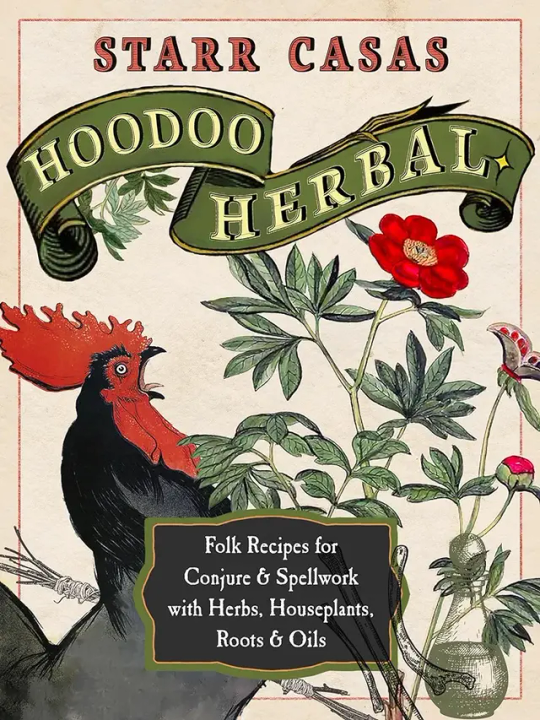
One thing that I think sometimes gets lost when we talk about Southern folk magic is that there's a lot of regional variation within the Southern US. Appalachian folklore and folk magic is trendy right now, but Appalachian traditions are actually very different from what other communities in the South are doing. While authors like Rebecca Beyer and Jake Richards do a great job of documenting Southern Appalachian lore, I think Starr Casas is one of the most high profile authors who covers what I would consider Deep South folk magic.
I know some people have issues with Casas, and I personally don't agree with her on everything (for example, she uses the words "hoodoo" and "conjure" interchangeably, while I use "hoodoo" specifically to refer to African American practices), but she is clearly very dedicated to documenting traditional Southern conjure as it was taught to her, and I can respect that.
This book is an herbal, and like most herbals, it's somewhere in between a spellbook and an encyclopedia. This is not a Conjure 101 book. Instead, this is a book for people who are already familiar with the basics and who want a reference book where they can quickly look up the lore and uses of different plants and curios in this tradition.
Pros:
• Like Casas's other books, this is very authentic to traditional conjure in the Deep South. She covers things in her books I learned growing up here but have never seen written down anywhere else.
• Very comprehensive. This book covers most basic herbs, but also goes into how to work with houseplants, curios, and Biblical figures.
• Great breakdown of the hot/cold and sweet/bitter system used in conjure, and explains how to choose herbs for a work based on these properties.
• Easy to use as a reference book. It's easy to flip back and forth to find information about a specific plant or curio. I read this as an ebook, which made it even easier to look things up by searching specific words.
Cons:
• Casas is very insistent that conjure must be passed down in person from an elder and is kind of condescending about people who learn conjure from books. This feels... not exactly like gatekeeping, because I see the point she's trying to make, but it rubs me the wrong way. I mean, the people in my family who knew this lore and practiced these works all died before I was born, and my parents and grandparents weren't interested in learning. My only option has been to reconstruct a personal/family conjure tradition based on local lore, talking to other workers, and yes, reading books. And while yes, I think books alone can only take you so far, I think we should acknowledge that not everyone has access to an in-person teacher.
• The other reason this bothers me is because Casas says her motivation for writing her books is to keep traditional conjure alive as the tradition's elders are aging and dying. So if she's aware that elders are dying without passing on what they know, why the insistence that true conjure can only be learned in person? Why write the books at all, then?
Other/Miscellaneous Observations:
• Casas feels very strongly that Christianity and the Bible are essential to conjure. If you do not feel the same, this book will piss you off.
• Casas is from Texas, and while I definitely consider her work more Deep South than Southwestern, there are some regional influences there. For example, Casas works with Catholic saints in an otherwise very Protestant magic tradition.
• Despite the above observations, Casas makes it very clear that she is not overly fond of churches and does not think you have to be a church-goer to practice conjure. She also talks about how she has taught conjure to people who aren't Christian, in case anyone was worried about that angle.
Conclusion: This is a solid reference book and a great collection of plant lore from the Southern US. I'm always happy to add books to my shelf that don't just parrot Western European herbalism, and it's nice to read a book that has info on New World plants. I have more issues with the philosophy/politics of this book than I did with Old Style Conjure by the same author, but this book does do a good job of showing what traditional conjure looks like. I recommend this as a reference for Southern US plant and curio lore, but definitely balance your perspective by picking up books from other authors and looking at other sides of the conversation.
Rating: 3/5 Stars
#book review#books#starr casas#conjure#southern folk magic#southern conjure#folk magic#folk witchcraft#witchcraft#witch#witchblr
24 notes
·
View notes
Text
Book bingo 2025
My friend @en-busca-de-mi-ikigai-blog tagged me on a cool literary bingo (hers is here) made up by @batmanisagatewaydrug (original bingo here)! So I'm gonna try and fill it up with books I read last year and books I'm planning on reading. It's on my storygraph too, since they made a version for it!!
Literary fiction: I don't think anything I've read this year counts as litfic, but I'd like to add some of it to my next year. I'm gonna use A pesar de Camelot by Verónica Pazos here - I met her in a lit forum and she is an amazing person overall
Short stories: I read some short books by Eduardo Mendoza this summer, and maybe fanfiction could count here? That's all for 2024, but I'm planning on finishing De nombre y hueso by several authors, a compilation of dark and supernatural stories by 12 trans authors and illustrators that I started and never finished
Sequel: I've read a bunch of sequels and series this year, like Jay Kristoff's The loto wars (loved it) or Eduardo Mendoza's El paciente del doctor Sugrañes. I'm planning on reading some other books by Almudena Grandes on her series Episodios de una guerra interminable, which I really recommend to anyone interested in the Spanish civil war
Childhood favorite: I haven't read any childhood favorites last year (not even Shadowhunters!) but this year I'm planning on reading some Fairy Oak yet again! Missing the softness of Elisabetta Gnone's writing I guess
20th century speculative fiction: This year I read some books in Stephen Hunt's series Jackelian (my fav one this year was From the deep of the dark, maybe, but my all-time favorite is The kingdom beyond the waves). I've yet to read two books from that series, so I might do that this year
Fantasy: I haven't mentioned yet American Gods by Neil Gaiman, which I read last year, so that´ll do. This year I'll try and finish The colour of magic by Terry Pratchet
Published before 1950: my oldest book read last year was published in 1986, León el Africano by Amin Maalouf, so nothing here. This year I want to read more war correspondant stories, so let's add The Memoirs of Sir Ronald Storrs (pub. 1937) to the list
Independent publisher: I haven't read anything independent in the last year, but I have a poem book by a friend of mine titled El mero intento de algo bueno, and I really need to read it this year so there it goes
Graphic novel/comic book/manga: I mostly read my comics in Tapas and I haven't been keeping track of them as books, so who knows. I might try and get some Calvin and Hobbes comics this year, maybe
Animal on the cover: León el Africano has a camel on it! I'm gonna leave it blank and see if I find one for next year
Set in a country I have never visited: Stormdancer by Jay Kristoff is set in a fantasy and steam-punk version of Japan, so let's say it works. This year I want to read some African literature and fiction, but I haven't picked titles yet, let's fill it up as we go
Science fiction: some books I've already mentioned count as sci-fi, and this year I might read XX by Angela Chadwick
2025 debut author: I didn't read any debuts last year, so let's see if I get one in this year
Memoir: nothing last year, and if a book can't fill two prompts I'll add Wishful drinking by Carrie Fisher
Read a zine, make a zine: I haven't read a zine in a while! I bought one on horror stories inspired by local folklore for a gift, so I'll read it before handing it out hehe
Essay collection: I haven't been counting the short essays I've read so I'm kinda lost about last year, but this year I intend to finish Más que visibles: antología de la bisexualidad y otras plurisexualidades, edited by Carlos Castaño and Ignacio Elpidio
2024 award winner: I have no idea if any of the books I read last year received any awards, and I think I'm not keeping track this year either, but we'll see
Nonfiction - learn something new: this one is cool! I have a bunch of non-fiction books in my to-read pile, but they are mostly about feminism, LGTB+ and anti-racism, which are topics that I have yet lots to learn about, but aren't exactly new to me, so I'll have to find one along the year
Social justice and activism: boy, here it gets hard. I don't think I finished one of these last year, so 2025 might be the year I finish Angela Davis's autobiography, or Ser mujer negra en España by Desirée Bela-Lobedde, or Biciosas o la necesidad de queerizar lo queer by Ana Amigo
Romance novel: last year I didn't read any romances (again, not counting fanfics xd), although Inés y la alegría by Almudena Grandes has a great love story. I don't know if it counts but this year I gotta read This is how you lose the time war by Max Gladstone and Amar El-Mohtar
Read and make a recipe: I do this all the time! I have a bunch of veggie cookbooks that I guess I should look into more, and I'm planning on recreating a local recipe with seitan sometime soon so let's count that
Horror: I don't really read horror because I scare easily, so I might not fill this one out haha
Published in the aughts: I think a bunch of the books I've read this last year were published between 2000 and 2009, so there's that. For this year, a book I'd forgotten I had in my list that I realized I really want to read: Strangers: Homosexual Love in the Nineteenth Century, by Graham Robb
Historical fiction: last year I read a bunch of Spanish civil war fiction by Almudena Grandes, but this year I'm finally reading Outlander, by Diana Gabaldon
Bookseller or librarian recommendation: last year I read books from my own list, so this year I'll mix this with my intent to peruse the library more, and get some fresh recs. I'll update this then!
This was fun! I don't think I have enough mutuals to tag anyone with confidence yet, but if you read this and wanna do it feel free to, and tell me about it!
2 notes
·
View notes
Text
Trying to find good books on mythology/folklore!
Hey so I'm trying to find some good books on mythology around the world! Currently I've got some for Egyptian, Norse, and Celtic but I've wanted to expand my knowledge on other mythologies! One of the next on my list is African mythology but I am having difficulties finding a good book/books for it.
The only one that I've seen to have a collection from all over the continent is more encyclopedic and has a biased/shockingly ignorant view of some things based off the reviews. These range from considering African "sorcerers" (Actual term being closer to Aje) as "Inherently evil" to getting the origins of "The Lion of Judah" incorrect and makes me hesitant due to other discrepancies that are likely inside the novel that aren't mentioned.
I do have African Myths from J.K. Jackson in sight but I'm struggling to find reviews that have any actual information on them. Any suggestions?
#Books#mythology#history#folklore#africa#east africa#west africa#south africa#central africa#north africa#Norse mythology#Egyptian mythology#greek mythology#celtic mythology#African mythology
2 notes
·
View notes
Text
i don't really talk about this a whole heap because i feel it's not the worst thing to experience in the world, but as an australian practitioner, it is isolating to be in the witchcraft community. i have seen barely anyone else who's aussie in my spaces, and almost every resource everywhere is based on northern hemisphere environments, plants, animals, etc. there is no easy way to being an australian witch, not in the same way as you would if you were in the northern hemisphere. usually you have to look very hard to find any kind of information about how to practice magic in an australian environment, and even then, it's usually likened to northern hemisphere counterparts. to this day i'm not sure if i'm comfortable with calling myself an "australian witch" purely due to the fact that this is ultimately what i have to pay for being on stolen land. and while i do reconnect with my italian-english immigrant background on a very intimate level, most folk practitioners DO advise me that folk magic starts with respecting what's immediately around you RIGHT IN THIS MOMENT. your environment, your community. i do not know how to connect with non-northern hemisphere plants. i don't even know what a kookaburra means when i hear it laugh (outside of being taught its folklore). is rosemary in australia more potent than its american counterpart due to the fact it's used in so much of aussie cooking? what about eucalyptus lollies clearing away any sinus issues? i wouldn't have a clue what anything means on a magical level. the point is, i want to connect not just with my ancestors, but with where i currently live. i feel i owe it to the land to incorporate it into my knowledge and practice and general love and appreciation.
anyway, rambling aside, i found this. this is still essentially "australian substitutions for northern hemisphere spell components" - but for what it's worth, it still helps to have some semblance of anything. i don't agree with every single comparison on the following lists, but for any aussie practitioner who happens to follow me and wants some way to connect with what they have available, this may be a good starting point for you. it's basic. really basic. and it's mostly just in relevance to a starting point in witchcraft specifically. but regardless, i hope it gives you as much hope as it did for me (all under the cut bc there's a lot of links). also to say the least i encourage individual research into folklore as well, it's stunning stuff. lastly, if you're from the northern hemisphere and happened to read this chonky post, thanks - i encourage you to learn about australia too, especially its history.
and lastly, i just discovered ayrmid sage. i plan to order some books as soon as i have the money, supposedly they're good.
5 notes
·
View notes
Note
Hey you can answer this tomorrow, but why women king was made…remember roots? I heard the og mc kunta kenta (Is that a real fucking African name?) didn’t understand what the Europeans was doing on the ports with slaves…even though he would have actually known-ooooh
But as you know that left a (bad) impact onto my community….but I keep realize one huge issue Africans have with my community is we try to keep the sanitize version of the slave trade we were taught even as middle age adults
Expect meee, god this pan Africa hurt us
Also people tried to compare women king to 300 and braveheart…haven’t seen braveheartt…but 300 was meant to be a glorified retelling of the battle of themployae
Women king have to twisted the entire course of history to write it
Roots managed to serve its purpose, at least the original one, suffered from extreme historical inaccuracies in places never saw the remake.
But as you know that left a (bad) impact onto my community….but I keep realize one huge issue Africans have with my community is we try to keep the sanitize version of the slave trade we were taught even as middle age adults
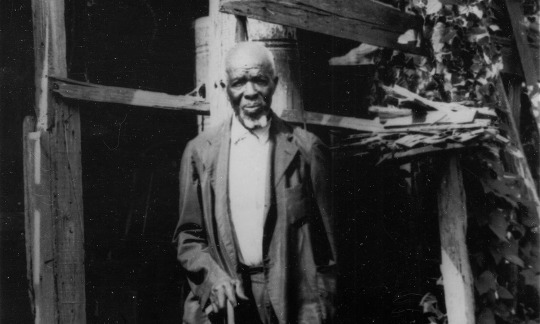
This is Oluale Kossola, his American name is Cudjoe Kazoola Lewis (he chose all but Lewis himself), he's the last known slave with distinct memories of life in Africa before being sold by the dahomey and put on a ship and smuggled into the US, human cargo was illegal by then but greedy and evil people on both sides of the Atlantic kept on doing it anyhow.
You can do some of your own reading if you like, but some highlights from his wiki page are.
In April or May 1860, his village was attacked and Lewis was taken prisoner by female warriors led by King Glele of Dahomey, during an annual dry-season raid for slaves. Along with other captives, he was taken to the slaving port of Ouidah and sold to Captain William Foster of the Clotilda, an American ship recently built in Mobile, Alabama, and owned by businessman Timothy Meaher. The importation of slaves into the United States had been illegal since 1808, but slaves were still routinely smuggled in from Spanish Cuba.
And this is from a article about a book about him
The pathos of the African American experience, told with such tenderness in Barracoon, is matched by its complexity. Hurston herself remarked that in writing Kossola’s harrowing account of how the king of Dahomey profited from raiding and selling members of neighbouring kingdoms, she was deeply affected by the question of African complicity in the slave trade. “The inescapable fact that stuck in my craw,” Hurston wrote, “was my people had sold me and the white people had bought me. That did away with the folklore I had been brought up on – that white people had gone to Africa, waved a red handkerchief at the Africans and lured them aboard ship and sailed away.”
One hell of a reality check right there
Also people tried to compare women king to 300 and braveheart…haven’t seen braveheartt…but 300 was meant to be a glorified retelling of the battle of themployae
ya if they wanted to do a Braveheart comparison they'd need to set it up so that the areas that the dahomey raided set up to fight againt the dahomey
Women king have to twisted the entire course of history to write it
Based on historical events, but we're not going to tell you that we did a 180 on who was doing what.
Could you imagine the fallout if someone made a accurate movie about that, painting all the perpetrators as what they were.
Wonder if finding out that if their ancestors hadn't been forced onto a boat there's a good chance they would have either been worked until they died or used as a human sacrifice might shift some viewpoints a little.
None of that is me expressing anything other than just curiosity, since this is tumblr and we piss on the poor who just want to read here I figure disclaimer is needed.
4 notes
·
View notes
Text
Stranded In Arendelle: Chapter 4
July 23rd, 1843
Eugene woke up in a cramped room. The first thing he saw as he awoke was a set of rusty metal bars. Upon seeing them, he immediately realized where he was: a jail cell.
Who? What? When? he worried.
He tried reaching for anything he could use in the area to escape. But there was nothing. Next thing he knew, a duo of pale blond Arendellian guards approached him. One was short and one was skinny.
“What are you Coronans planning on using our weapons for?” demanded the short guard.
“Self-defense and helping other nations,” responded Eugene.
“Like that starving African place?” sneered the skinny one.
“It’s called Hawada, and yes,” Eugene winced.
The guards lowered their pistols.
“For what?” yelled the skinny guard. “Guns and swords don’t stop meteorites!”
“There’s a war going on down there as well,” stated Eugene.
The short guard growled.
“There are always wars in Africa!” menaced the short guard. “You can’t waste our supplies like that.”
Eugene tried his best to think of a good reason to help Hawada beyond the decency of ensuring they could survive the Italian army’s attempts to invade them while the meteors were still ravaging Hawada. Basic morality was not going to appeal to Arendelle’s rulers until it was too late.
“Hawada gives us livestock and tropical fruit,” Eugene told the guards. “And precious stones for jewels. Do you understand why we need them?”
“Now, now,” Prince Hans came in, “I need to answer some questions right now from my current subjects. They are very much in a frenzy right now. Would you two come with me?”
“Yes, your highness,” answered the skinny guard.
Eugene was about to ask Hans if he could leave his cell, but Hans put that to a stop.
“Don’t you go anywhere,” Hans said in cold blood.
…
The prince of Corona felt incredibly dismayed. All he wanted was to have a break from most royal duties. To only have to finish up the trade deal and then vacation with his wife all they wanted. But instead, he was imprisoned with no way to find out if Rapunzel was even surviving the snowstorm.
Eugene heard a rustling to the left of his jail cell.
“You okay?” asked the voice.
“Not really,” sighed Eugene.
Eugene turned around. In the cell next to him was a brown man in his mid-20s wearing a set of overalls. He looked a little like an older Varian.
“You must be new here,” he told Eugene.
“I’ve never been to jail in Arendelle before,” Eugene responded.
He didn’t bother to tell him about the numerous times he had been to prison in other places.
“I’m Tony,” Tony said. “And you?”
“Eugene Fitzherbert,” Eugene stated.
“You can just call me Eugene. How long have you been here?”
Tony scratched his head.
“A few months,” responded Tony. “I got in here because my ex-girlfriend accused me of using dark magic. She’s a high ranking aristocrat. I'm a peasant from America. And because most Arendellians are freaking scared of even regular magic, everyone believed her.”
“Do you practice magic?” Eugene blurted out.
“Hell no,” answered Tony. “I just like to read books about ancient mythology and folklore. It fascinates me.”
“Damn,” said Eugene.
Eugene looked around his cell.
“Do you know how to get out of here?” wondered Eugene.
“I wish,” said Tony. “There’s a broken crevice in between our cell walls. But I’m not sure if that would have helped anyone to escape. Besides, I didn’t bother to use it. I’d rather stay here for a few more weeks than have to run like a fugitive for the rest of my life.”
“Well, I need to get out of here soon,” snarked Eugene.
All of the sudden, Eugene had an idea.
“I’m going to try to break this crevice,” stated Eugene.
“Go ahead,” responded Tony. “I’m not going anywhere.”
Eugene used his old jail escape skills. First, he broke the crevice. When that only loosened the cell dividers, he took a shard to pick his lock. He studied the keyhole’s shape and modified his lock pick accordingly. Once that was done, he opened up his gate.
“Second thoughts?” Eugene asked Tony. “I have keys for the both of us.”
“Actually, come to think of it…” Tony contemplated, “I’m not sure Arendelle’s even going to be around a few weeks from now. Might as well do some exploring.”
Eugene then opened the door of Tony’s cell. The guards still weren’t back yet.
“Let’s go!”
(Wattpad version: https://www.wattpad.com/1464125415-stranded-in-arendelle-chapter-4)
#creative writing#story#storytelling#tumblr#tumblr stuff#writing#crossover#eugene fitzherbert#fanfic#fanfiction#tangled spoilers#tangled the series#tangled#rapunzel’s tangled adventure#frozen spoilers#frozen#oc
1 note
·
View note
Note
Curious: what are your favorite type of fairy stories listed in the Aarne-Thompson enciclopedia classification?
First off, it's nice to meet you and thank you for asking! Secondly, I want to preface this: I'm not a student or a scholar of folklore as a genre, and my knowledge of ATU is limited to what I've managed to find online over the years. More often than not, it's either something I've found on JStor in college, something in a Maria Tatar book, or this website.
Still, I love seeing these stories and all their variations across times and places. Without further ado:
306: The Worn-Out Dancing Shoes: I love the mystery element of this story, and I'm forever intrigued by all the variations of the other world the women travel to, whether it's the palace of Indra, the court of Satan, or something else entirely. Many versions attribute their actions to some curse that must be broken to achieve a heterosexual happy ending, but it's in the in-between that this story really sings to me. And a not-quite-variant of it, "Kate Crackernuts", may just be my favorite fairy tale of all time; how often is the ugly (or at least, "less bonny") stepsister the hero of her own story?
310: The Maiden in the Tower: I'm a sucker for a magical chase, and Rapunzel's relatives absolutely provide. My favorites include "Snow-White-Fire-Red", "The Canary Prince", and "Louliyya, Daughter of Morgan".
311: Magic Flight: Stories of magical escapes from dire situations, like "Sweetheart Roland", "The White Dove", "The Fox Sister", and "The Tail of the Princess Elephant".
407: The Flower Girl: Plants who become women or vice versa, often coupled with an escape from an abusive romance. I love these stories purely for the folkloric weirdness factor: "A Riddling Tale" (shout-out to Erstwhile for introducing me to this one), "The Gold-Spinners", "The Girl in the Bay Tree", and "Pretty Maid Ibronka".
451: Brothers as Birds: This one's purely on my love for the Grimms' "Six Swans" and "Seven Ravens". I love a resilient heroine who draws her strength from her family. I admittedly haven't read many others, but these two mean so much to me they get a place here entirely on the strength of these two.
510B: All-Kinds-Of-Fur: The story of a woman's escape from her incestuous father who then gets a Cinderella ending. I admire the heroine's courage in face of an all too real type of monster. Grimms' is a favorite, as is "Florinda" (which could also qualify as 514), "Princess in a Leather Burqa", "The She-Bear", and "Nya-Nya Bulembu".
514: The Shift of Sex: I first came across this story when I stumbled on Psyche Z. Ready's terrific thesis some years ago and I haven't been able to get it out of my mind since. All of these variations from all over the world -- I find it cathartic to know that we've been asking these questions about gender and sexuality forever, and a happy ending is an imaginative possibility.
709: Fairest of Them All: This I owe squarely to Maria Tatar's anthology from a few years ago. Unfortunately, this also means that there are several I can't find online, including "Kohava the Wonder Child" (a rare Jewish heroine in a genre infamous for how it absorbs anti-Semitism) and "King Peacock" (one of the few African American fairy tales I know, also included in Tatar's collaboration with Henry Louis Gates). I love "Princess Aubergine", "Little Toute-Belle", and especially "Gold-Tree and Silver-Tree" - my little bi self was elated to stumble across a princess who lives happily ever after with her kind and gentle limbo husband and her cunning and resourceful wife.
Even as a hobbyist, I love folklore and fairy tales. I love these little glimpses into other cultures, and I love the way these story structures act as magnets for so many nuances of people's lives across history. Still, I hope this answers your question, gives a glimpse into my experience with fairy tales as a genre, or (at the very least) gives you some new and interesting stories to read!
#ariel seagull wings#ask response#fairy tales#the six swans#12 dancing princesses#Kate crackernuts#snow white#rapunzel#the canary prince#the fox sister#sweetheart roland#wild swans#all kinds of fur#donkeyskin#fet fruners#gold tree and silver tree#Aarne Thompson Uther index#the classification system isn't perfect#because nothing is#but it's still a great resource for nerds like me who eat this stuff up like candy#I also have a whole list of fairy tales that don't fit neatly into ATU#but that's beyond the scope of this person's ask#feel free to talk to me about fairy tales any time!#I love this stuff and I love finding people to enjoy it with!
146 notes
·
View notes
Text
Names for Isaac’s Night Creatures!
I got my hands on the art book for Castlevania Netflix, and it had a lot of cool stuff! Unfortunately, if you’re here for a comprehensive look at the show’s night creatures, you might be a bit disappointed... Only a few have their models shown, but never a full character model sheet; Some are depicted only in concept art, and some not at all, such as Queen B, whom we DID get an actual character model sheet for!

But amidst this disappointment, we did get lots of new information! Particularly with Isaac’s army of night creatures, my favorite... Apparently a lot of his monsters are based on creatures from African folklore, something I’d never considered, but in hindsight it makes a lot of sense! African folklore is an incredibly broad yet highly underrepresented category.
Since Castlevania is no stranger to directly naming/adapting its bestiary after folklore and myths, we may as well go with these names! Of our new names, there’s the Abada, AKA Isaac’s demonic steed;

There’s Ninki Nanka, a long and reptilian creature once compared to a Chinese dragon;
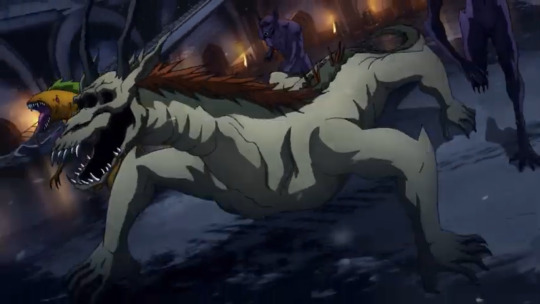
We also have mentions of a Bultungin. In folklore, this is a werehyena... So most likely this night creature, which fits the description more than anyone else;
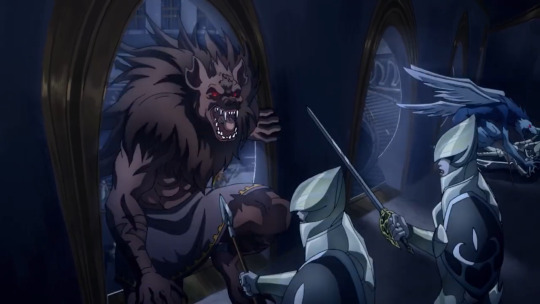
Impundulu means Lightning Bird, so obviously these creatures (also shown in the previous picture on the right)!
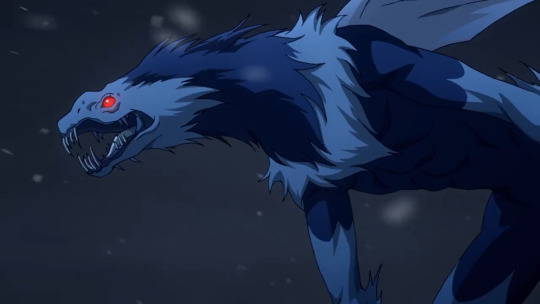
They’re a particular favorite of mine, and I liked to call them Lightning Harpies before we got the art book! There’s also the Rompo, though we already know that the one we see in the show is called Rompa, according to a tweet!
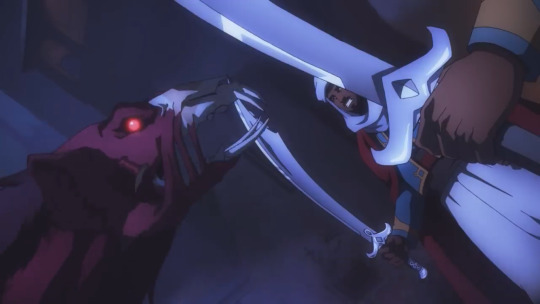
Finally we have the Grootslang, which... Aside from Abada, none of the names are specified, so it’s up to the reader to figure out which Night Creature was adapted from which myth named.


The Grootslang confuses me most, because in folklore it’s described as a giant serpent... So possibly the night creature with actual scales, but some renditions of the myth give the Grootslang elephantine features.
The latter creature has more mammalian characteristics in addition to its serpentine tail, as well as the larger fangs that are more like tusks! I honestly can’t tell which of these is meant to be the Grootslang, the night creature with the spear, or the one that gets memorably killed as the first casualty against Legion.
We also have the Merman and Abel (from the games), as well as Flyseyes and Fisharoo (fully original). To cap this all off, knowing Isaac’s night creatures are named after African folklore, might I suggest Anansi as the fanon name for this spider-like creature?
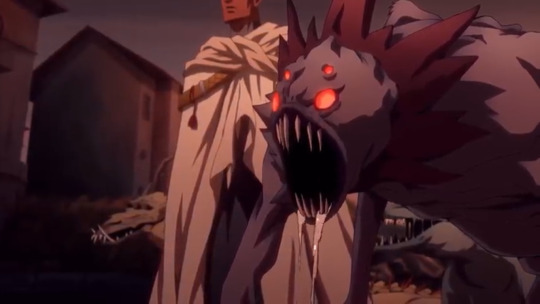
Anansi is a famous spider trickster deity from Akan folklore, and this night creature’s appearance reminds me of the story of how Anansi’s legs became long and thin; To put it in a nutshell, it’s because of his hunger that led to Anansi’s limbs being pulled and stretched out like that.
The spider creature also has attention drawn to its potbelly in the art book, which COULD be a reference to that appetite, amidst the obvious drool... Is this a stretch? Perhaps. But for now, I’m happy with my suggestion of Anansi as the name for this night creature!
I might look into creatures from African myth after this... Knowing some (but not all) were inspired by that folklore makes me want to find names for the rest, same with Anansi!
#castlevania#castlevania netflix#isaac laforeze#night creatures#bultungin#ninki nanka#Abada#impundulu#rompo#rompa#Anansi#Grootslang#Queen B
123 notes
·
View notes
Text
So something I really like is reading and watching movies/shows/books that represent minorities and their experiences in better ways than the past. And it’s important to do so because it educates people that are not in that community and helps us to understand it better! So I wanted to share some recommendations I personally love:
Bipolar rep- Anyone else tired of wanting accurate representation of bipolar disorder and all you get is Silver Linings Playbook which despite being a funny movie, exaggerates bipolar disorder and doesn’t show people with bipolar disorder in the best light? Try Spinning Out. It’s a Netflix original show about a young woman who’s a competitive skater. It sadly didn’t get picked up for a season 2 BUT it’s one of the best shows on Netflix. The girl and her mother both have bipolar disorder and I love it because it’s an amazing show and doesn’t romanticize bipolar disorder. It shows it in an accurate light.
Trans rep- We need more trans rep. But good trans rep and trans characters played by trans people. Try Cemetery Boys. It’s a YA supernatural latine book written by a trans latine man. Not only does it show hispanic culture in a beautiful way but it’s great trans rep! The story basically follows a trans man who lives in a cemetery. As a part of his culture, all men are witches and tend to the dead while the woman heal. He’s desperate to prove he’s a witch so he tries to raise his cousins spirit. And he succeeds. Kind of. He summons a spirit although it isn’t his cousin. The books is funny, emotional, and rich!
Jewish/Muslim rep- I’m tired of horrible rep for Jewish people and Muslims. It’s so ingrained into society that sometimes we barely notice. We need to read more books that showcase Jews and Muslims in a positive light. Try Yes, No, Maybe So. It’s a YA romcom about a Jewish boy and a Muslim girl who get put together to campaign for a local election. It talks about antisemitism and islamophobia. The book is also funny and the romance is adorable. It’s written by two people (because the book is split between the two main characters perspectives) and one of them is Jewish and the other is Muslim!
Latine/Undocumented rep- I’m tired of immigrants being demonized (especially from these past 4 years) and it’s hard to find a good book about latine’ sand their experiences. I finished this book last month and wow, it’s AMAZING. The book is called Lobizona and it’s a YA fantasy by Romina Garber. It’s about an undocumented girl who finds out her mother is hiding secrets when she gets detained by ICE. The main character finds a school of magic and has to pretend she’s one of them. Which then she finds out she is. This book is based on Argentinian folklore and has all latine characters. It’s like a latine Harry Potter honeslty lol! The world building is amazing and you’ll fall in love with the characters! What I really loved about this book was how it showed undocumented immigrants in a positive light. It showed how they come here for oppportunity and a better life, not to steal jobs.
Black rep- Let’s pick up books with main black characters that isn’t just The Hate U Give (no shitting on that book, it’s amazing but there are other books with strong black leads). One of my personal favorite books is Children of Blood and Bone. Its a YA fantasy based on African folklore and takes places in Orisha. In this world, you’re either a maji or not. Maji have white hair and they’re treated like second class citizens. This is because years ago, the maji had magic. They belonged to various clans that had a deity. You could be a reaper, lighter, burner, etc. But years ago, the magic was wiped out by the current king. The books follows Zelie who accidentally gets her magic awakened when the princess runs away and brushes her arm (holding a magical scroll). The books follow Zelie, her older brother, and the princess on their way to awaken magic for everyone and give maji the equality they deserve while being hunted by the king and the prince. Amazing series. The third book comes out this year I believe! It has magic, it has heartbreak, it’ll make you bite your nails, and all the characters are black.
112 notes
·
View notes
Text
Sam's Masterlist of Beginner Resources
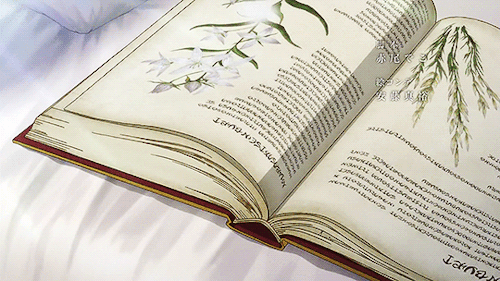
These are some of my favorite books, podcasts, and blogs that can help you develop your spiritual practice even if you have zero previous knowledge. All of these resources are approachable enough for total beginners, but I also recommend them for more advanced practitioners who want to brush up on the basics. Some books are listed in multiple categories because they cover multiple topics.
This list will be updated continuously as I find new resources that I want to recommend.
Secular Witchcraft (witchcraft that is not part of an established religious or spiritual tradition)
Witchcraft for Everyone by Sam Wise
A Witch's Guide to Spellcraft by Althaea Sebastiani
"Witchcraft for Skeptics | Science and Theory Behind Magick" by Jessi Huntenburg on YouTube
A Green Witch’s Cupboard by Deborah J. Martin
By Rust of Nail & Prick of Thorn by Althaea Sebastiani (this book is about protection magic specifically)
Witchcraft Traditions (witchcraft that is part of an established religion or spiritual path)
Wicca For Beginners by Thea Sabin
Wicca: A Guide for the Solitary Practitioner by Scott Cunningham
Reclaiming Witchcraft by Irisanya Moon
The Spiral Dance by Starhawk (written by a founder of Reclaiming, but also contains elements of Wicca and Feri)
Betwixt & Between by Storm Faerywolf (about the Feri tradition)
Witchcraft in History and Culture
Waking the Witch by Pam Grossman
Witches, Sluts, Feminists by Kristen J. Sollee
Witches, Midwives, and Nurses by Barbara Ehrenreich and Deidre English
Paganism
Wicca For Beginners by Thea Sabin
Wicca: A Guide for the Solitary Practitioner by Scott Cunningham
The Spiral Dance by Starhawk (written by a founder of Reclaiming, but also contains elements of Wicca and Feri)
Irish Paganism: Reconstructing Irish Polytheism by Morgan Daimler
Morgan Daimler's YouTube channel (Irish paganism and Fairy lore)
Lora O'Brien's YouTube channel (Irish paganism)
The Irish Pagan School
Temple of the Cosmos by Jeremy Naydler, Ph.D. (Kemetic paganism)
The Way of Fire and Ice by Ryan Smith (Norse Heathenry)
On Black Wings: A Site for Fire & Ice Heathen spirituality and practice: https://www.onblackwings.com/
Skald's Keep: https://skaldskeep.com/ (Norse Heathenry) (on tumblr as @skaldish)
North of Annwyn: https://northofannwn.wixsite.com/home (author is Heathen but posts about magic and paganism more generally; author is currently on hiatus) (on tumblr as @north-of-annwn)
American Folk Magic
New World Witchery podcast
Southern Cunning by Aaron Oberon (Southern folkloric witchcraft)
Mountain Magic by Rebecca Beyer (Appalachian folk magic)
Backwoods Witchcraft by Jake Richards (Appalachian folk magic)
Sticks, Stones, Roots, and Bones by Stephanie Rose Bird (Hoodoo, African-American magic)
Divination
Kitchen Table Tarot by Melissa Cynova
Astrology for Real Life by Theresa Reed
Fifty-four Devils: The Art & Folklore of Fortune-telling with Playing Cards by Cory Thomas Hutcheson
Religion, Spirituality, and Politics
"Rethinking How Paganism Engages Culture" by Sam Wise (blog post: https://www.samwisethewitch.com/post/rethinking-how-paganism-engages-culture)
Bringing Race to the Table edited by Crystal Blanton, Taylor Ellwood, and Brandy Williams
"Witchcraft PSA: The Chakras & Cultural Appropriation" by Anthony the Witch on Tumblr (https://anthonythewitch.tumblr.com/post/187293358858/witchcraft-psa-the-chakras-cultural)
Bright-sided by Barbara Ehrenreich (deals with toxic positivity)
McMindfulness by Ronald Purser (this one is a little bit dense but has a very important message about how American mindfulness culture misappropriates Buddhist practices)
UPDATE 10/11/2024: Removed H. Byron Ballard's book due to transphobic posts on the author's social media. (See here for proof, but huge trigger warning for transphobia, biological essentialism, and pseudoscientific talking points.) I've replaced Ballard's book on the list with two other beginner books on Appalachian folk magic from authors who, as far as I know, are not transphobes.
UPDATE 1/20/2025: Removed Jambalaya by Luisah Teish due to someone pointing out that Teish has spoken at anti-transgender events hosted by the TERF org Women's Declaration International. I hate not being able to recommend Teish's work anymore, but as she's actively using her platform to spread hate, I just can't promote her books in good faith.
#long post#baby witch#baby witch bootcamp#books#book rec#book review#book recommendations#witch#witchcraft#witchblr#folk magic#southern folk magic#hoodoo#voodoo#heathen#heathenry#norse pagan#norse paganism#irish pagan#irish paganism#kemetic polytheism#kemetic paganism#wicca#wiccan#reclaiming#feri#my writing#mine
340 notes
·
View notes
Note
Are you of the opinion that giving a character voice acting essentially robs the reader/viewer of their agency on how they imagine a character sounded like? So to put it in another way, would no voice acting be better than any? A Sonic-related example would be Classic Sonic, who isn't voiced in Generations, but the main inspiration for this question is Bill Watterson's hesitancy in giving his characters voices.
I mean this is just a different version of the argument people sometimes make where, like... there were people who were against making movies based on the Harry Potter books, right. Because some kids might imagine themselves in Harry's shoes, or retroactively J.K. Rowling said she imagined different characters in different nationalities when she was writing them (famously I believe some people interpret Hermione as african-american).
The idea that movies might damper the imagination inspired by books isn't entirely incorrect. However, in my experience, it's also just different mediums and reaching different audiences, right.
I don't read a lot of fiction. I know I should, I've made more efforts to in the past, and it just never works out. Maybe it's my ADHD brain or whatever, but I'll start a book and never finish it. Even audio books are like this for me a lot of the time.
But there are two books I've finished in my life: Michael Crichton's Jurassic Park, and its sequel, The Lost World. They are pretty much the only fiction books I've ever read purely for fun, and also, more importantly, finished reading.
I would have never tried reading those books on my own terms if I did not see the Jurassic Park movie first. The movie is what sparked my interest in the books.
And the books, for what it's worth, are VERY different experiences! By their very nature, books are longer, more detailed stories than most movies. If you translated the Jurassic Park book into a movie, as an exact replica of the novel, it would be something like 6 hours long. Maybe closer to 8 or even 10 hours. To get a watchable movie, you have to cut a lot of scenes out and streamline things to a huge degree.
The Jurassic Park book opens with this long vignette that's practically a whole short film itself -- it starts with recapping the history of the "designer genetics gold rush" of its world, and focuses on a hospital at the edge of Costa Rica that continually receives patients with strange, poisonous bite marks from unidentifiable animals. The head nurse there suspects a conspiracy, because the patients are all InGen construction workers flown in from a nearby island and they refuse tell the doctors how they were injured. Clearly something else is going on. It weaves together with Costa Rican folklore about demons that visit cursed villages in the night and steal their children, only for one of the nurses to witness a creature in the newborn ward doing just that before seeing it skitter back in to the jungle. (The implication being that it was a dinosaur, of course)
If translated to film, that entire sequence would be 10-20 minutes long, if not more. Instead, it was condensed down in to the far more action-heavy "SHOOT HER!" opening scene. It gets some similar ideas across, but it is nothing like the book. It only lasts two minutes.
And not only is there a lot of stuff like that, but characterization is often dramatically different, too. John Hammond is much less sympathetic in the book, and much more of a villain. Alan Grant is more of an Indiana-Jones-type cowboy who is deeply ignorant of even the most simplistic modern technology. It goes on and on. There's one particularly great chapter where Grant is piloting a pontoon boat down a river while being stalked by a T-Rex that swims like a crocodile. They painted concept art for it for the movie, but it never even made it to storyboarding.
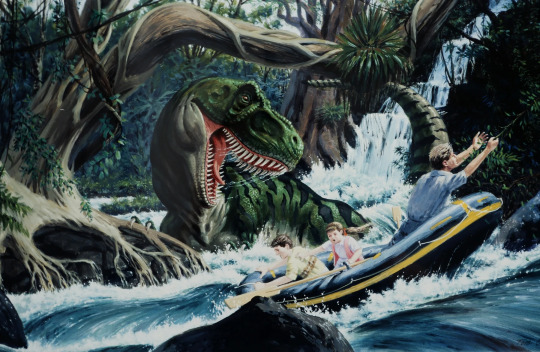
There's even a level for it in the Genesis game!

And if we're talking about The Lost World, well... 80% of that book is a completely different story from what ended up in the movie. The book has dinosaurs that camouflage like chameleons! It's terrifying!
For me, at least, it means that they don't even really compare. I find it much like how comic books feature multiverses and showcase many alternate versions of a character, where Ultimate Spider-man's Peter Parker is a different guy from the original "616" Spider-man. The book interpretations of Alan Grant, or Hermione Granger, or whoever are usually entirely different people from how they are portrayed in movies, or cartoons, or whoever. Ergo, it's hard to visualize Sam Neil as the book's version of Grant in Jurassic Park.
Even in comic books. A couple years ago I went through and read all of the original Dragon Ball. I cut my teeth watching the Saban dub of Dragon Ball back in 1995 and 1996, so I knew in my head what I thought these characters sounded like, but after reading deep enough in to the manga, that all kind of faded away and it just became it's own thing. Every now and then my mind would drift back to reading the dialog in the voices from the Saban dub (or the voices from Funimation's re-dub of Dragon Ball from 2005), but for the most part it stood on its own as its own thing. I mean, that's one of those things that lead to Dragon Ball Kai, right? Because the anime ended up just that different, and they wanted to re-edit it to be more faithful to the original books.
Not everyone has a good imagination. Reading can help facilitate and exercise a dormant imagination, I guess, but representing these things in other media formats can also aid those who struggle with the original text. Again, I'd never have read Jurassic Park if it wasn't for the movies. I'd never have read Dragon Ball if I wasn't feeling nostalgic for the anime. An important bridge was formed by adapting these properties so that other types of people could also enjoy them. It all contributes to a richer overall experience for all involved.
The only thing I'd say is that giving Classic Sonic a voice is a different kind of stylistic choice, because as Sonic Mania Adventures has shown, you can still use those characters to tell stories without necessarily having dialog. The difference there is that characters like Calvin or Hermione or Alan Grant are written with dialog in mind, and you change who they are by translating them across media types. How Classic Sonic is depicted is a bit more of a strange beast because he's been left mute. I suppose it's not that different, but it's still a little different regardless.
#questions#winstein-nin#sonic the hedgehog#sega#sonic team#harry potter#hermione#jurassic park#alan grant#reading#fiction#books#dragon ball#interpretation
12 notes
·
View notes
Text
approaching very old stories, stories from ancestors, stories from elders
inspired by the thread "How to Read Myths and Folklore" by Mythological Africans, i'm sharing my approach to very old stories, stories from ancestors, and stories from elders.
while i hope that this might be useful to any reader, the context here is that i'm a westerner who grew up in a western family with western values. i was educated in western schools with their values.
the mainstream white western relationship with very old stories is complicated. the abrahamic stories (judaism, christianity) are well-respected, but even most of the west's own old stories (norse stories, greek stories, little old village stories, etc.) are treated as myths (in the sense of "things people used to believe as true but that are generally no longer considered true because of scientific advances in understanding about the world").
among western peoples, most of what might be called "indigenous" culture (including stories) was suppressed & destroyed a very long time ago. christianity has been dominant in europe for so long that aside from things like the old religion of ireland, very little remains that's commonly known. specific national stories might be historical epics/legends, "fairy tales", & "mythology." often pre-christian beliefs in europe are lumped into a sort of generic "nature worship" and then dismissed.
the mainstream white western attitude is that there is little of value in very old stories for people today. newer knowledge is more highly valued. there are people who still study aristotle, etc., but generally, aside from judaism & christianity, there aren't many extremely old stories that western people value today. and many westerners are not religious & don't take their peoples' religious traditions seriously either.
(i would argue that part of this skepticism comes from the triumph of science in setting itself up as the only source of truth. part of it also comes from the fact that most of the old stories are religious, from large, patriarchical, institutionalized religions that have abused the idea of "listen to your elders" to keep people down. by not being wise elders, they have made people not trust them and also not trust the idea that listening to one's elders is important. these elders tell women to submit, tell gay people they are going to hell, claim to be virtuous while abusing children, and all the other things that have shown them to be bankrupt. there is no trust.
even aside from religious elders and ancestors, other thinkers from europe's past (ancient philosophers, national heroes, etc.) were not good people who had all kinds of terrible ideas, including racism, sexism, support for imperialism and monarchy, support for slavery, support for exploitation of natural resources, etc. the western (liberal) story goes: "people in the past were barbaric and we are more enlightened now." because of the universalizing part of western culture, this is treated as true for all people everywhere, not as something that's specific to particular peoples.
in western education, we usually don't learn that among many peoples of the world, ancestors & elders are considered wise, trusted, caring, and had many gifts to share with younger generations. i believe it's important to understand this when listening to & reading very old stories. not to say that elders were *necessarily* wise, but to accept that people from different groups see their own ancestors and knowledge passed down from ancestors in different ways.)
after considering all that, here are some specific ways i approach very old stories, stories from ancestors, and stories from elders:
first, i think about the source of the story i'm reading/listening to. how did this story come to cross my path? who is telling it? are they telling a story from their own people? what are the conditions under which i am encountering this story? among many peoples, sharing a traditional story is not done lightly. as a listener, i understand that it's an honor to be an outsider hearing a story. i have to understand who i am, who the speaker/writer is, what is our relationship (are we a settler & a colonized person? are we an "educated" person and a person from the village? it makes a difference!) who is the speaker/writer's intended audience, what is the context in which i am receiving this story?
here is an example: i live on hawai'i island (i'm a white (but also jewish and immigrant) settler on hawaiian land). every year there's a large festival and competition of hula (traditional hawaiian dance) called merrie monarch. hula is an ancient art form, sacred to the goddess laka. hula is often accompanied by singing, chanting, and is a whole performance. there's a huge variety: hula can be for ritual, for entertainment, to tell/perform historical stories, to prepare for battle, to be playful, to welcome visitors, to welcome the birth of a child, and for many other purposes. there are similar dances all across the pacific, and usually groups come from all over the world to share the very best they have to offer. as such, it's an important event for hawaiians and for other pacific people.
here are some excerpts from merrie monarch 2019 to give you an idea of what it's like:
youtube
if i'm in the audience, or watching merrie monarch on tv, i have to understand that i'm an outsider spectator and that this event is mainly by and for hawaiians and other pacific people. i am an outsider who they have graciously let in to their culture in this way. i think it's important to understand all this in order to take the proper attitude towards old stories. see them as a gift from the speaker/writer/performer that one is being allowed to hear. the next thing to consider: who is the teller? in english (the only language i have experience reading stories in), we often get stories from non-western peoples as filtered through white westerners. i take all of these with a grain of salt. if at all possible, i try to find the story as told/written by someone *from the group* that the story is from. i mostly skip over retellings/interpretations by white westerners entirely. if the story is within an anthropology text, i'll try to get any historical context that the anthropologist provides, and then just read the story itself. white western interpretations of non-western stories are usually a garbled mess. translations can also be a minefield. here in hawai'i, anthropologists & folklorists have been "recording hawaiian stories" for over a hundred years. it's a complicated history of tellings of tellings, translations that have become canon, and more. (if you're interested in learning more, i recommend the excellent book Mai Paʻa I Ka Leo: Historical Voice in Hawaiian Primary Materials, Looking Forward and Listening Back by M. Puakea Nogelmeier. it discusses the formation of an english-language canon of a huge archive of hawaiian-language newspapers, which contain many serialized stories & legends.) although it may seem difficult, i encourage you, the reader, to learn about the complicated landscape around the story you're reading/listening to. in other words, how did this particular version of the story come to end up with you? the preface and introduction in a book can often provide a lot of background info on the text in your hand. you don't want to be reading the hand-me-down version of some white supremacist's version of the story, assuming that that's really the story of a certain people! if at all possible, try to get to the actual words of the people whose story it is. also, consider that like hula, "stories" are not just the words, but might include the dance, the music, the performance, how the words are delivered, etc. "the story" might be all of those things together. the listener/reader's understanding might only arise from having that whole experience...without it, you might not get the actual message the story is meant to give. a story that might seem violent and off-putting in text, it might turn out that it's commonly told around a campfire to entertain children, complete with fart sounds and jokes. knowing that is important. that kind of story is very different from a story told during a ritual, or a creation story. aside from the conditions under which the story is told/performed among a people, it's important to know how old the story is. i've seen anthropologists describe stories from the late 1800s as "very old." i would dispute that characterization. generally, the older a story is, the more carefully i listen. often the storyteller will tell you the age and context of the story. they might say "this is a story i heard from my elders. this story has been among our people for many generations." ok, so i am about to hear a story passed down for many generations...it's a story that people remember and a story that people think is important enough to pass down to their children, who in turn remember it and pass it down. how many stories do *i* have like that? exactly zero. so in my mind, when i hear "this is a story that's been passed down among my people for generations," i listen carefully because something important is about to be shared. the teller/writer will often also tell you why they're sharing the story or who it's meant for. i've heard things like "this story is important not just for
our people, or for indigenous people, it's important for people all over the world." well in that case, i better listen. sometimes they might say "we are recording this story for younger generations", to help their own people remember their peoples' stories. stories told to anthropologists can be a whole minefield. imagine you're minding your own business at home, when an anthropologist shows up and wants to ~record your stories~. why? just because they're interested and want to share them with their pals back home. now imagine that those anthropologists are of the same background and from the same people who have colonized your land, enslaved your people, driven your people from your land, and continue to marginalize your people. this anthro might claim they're "not like that", but once you've given them the story, maybe you never hear from them again and you never even see what they actually wrote in their book. it's important to remember that there's a story extraction history. white westerners have built careers off "harvesting" stories from non-western peoples. what have they given back? it's even worse when you consider that many white members of the academy are seen as "experts" on the culture they study (even if their understanding is poor!), while members of that culture are excluded from the western academy and can't get their works published. it's important to consider that history when reading stories in anthropology (and similar) books. many people have had generations of anthropologists come and go, all asking for stories. let's just say that i wouldn't blame them if they gave a silly or "fake" story to the latest generation of clueless white anthro. i have no way to know how common it is, but i've read at least one story that led me to wonder "is the person telling the story just taking the piss out of this anthro?" how many stories might subtly mock or poke fun at the westerner and the westerner doesn't even realize it? it's something to consider. which brings me to the next thing i consider: many meanings. oral traditions are often incredibly rich and nuanced. some stories are straightforward (maybe it's a story to entertain) and some stories have *many* layers of meaning, including historical, political, serious, humorous, and much more. you might have to hear the story or understand the tone the teller uses in different parts of the story to understand whether something is meant to be serious or funny. you may have to know a lot about the history, culture, and context of the story to understand all the layers. (for an excellent example from here in hawai'i, i recommend the book Ka Honua Ola: ‘Eli‘eli Kau Mai / The Living Earth: Descend, Deepen the Revelation by Pualani Kanaka‘ole Kanahele. she goes line-by-line in several important chants discussing the multiple meanings.)
anyway, these are the main things i keep in mind when approaching ancient stories, stories from ancestors, stories told by elders. i hope this helped you. if you see anything i've gotten wrong, please let me know! thank you for reading.
3 notes
·
View notes
Text
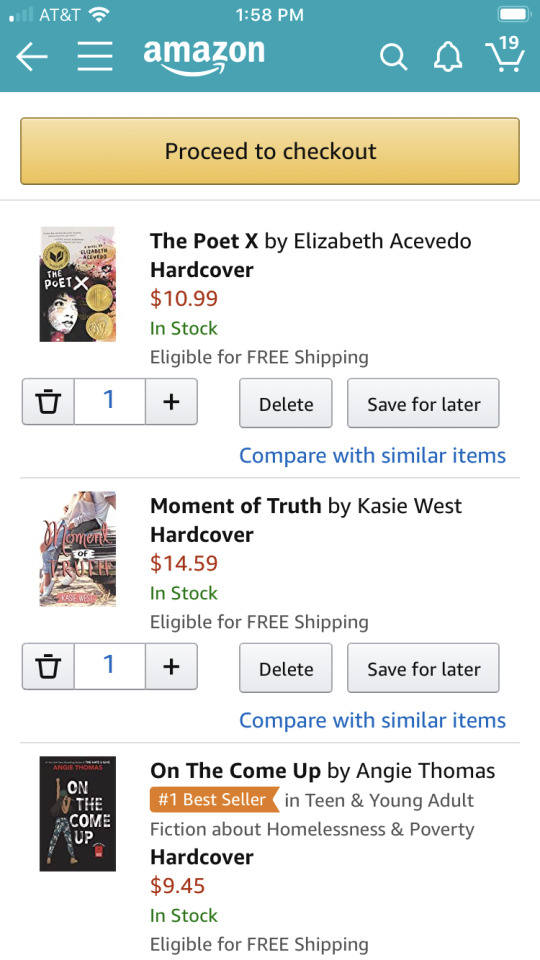
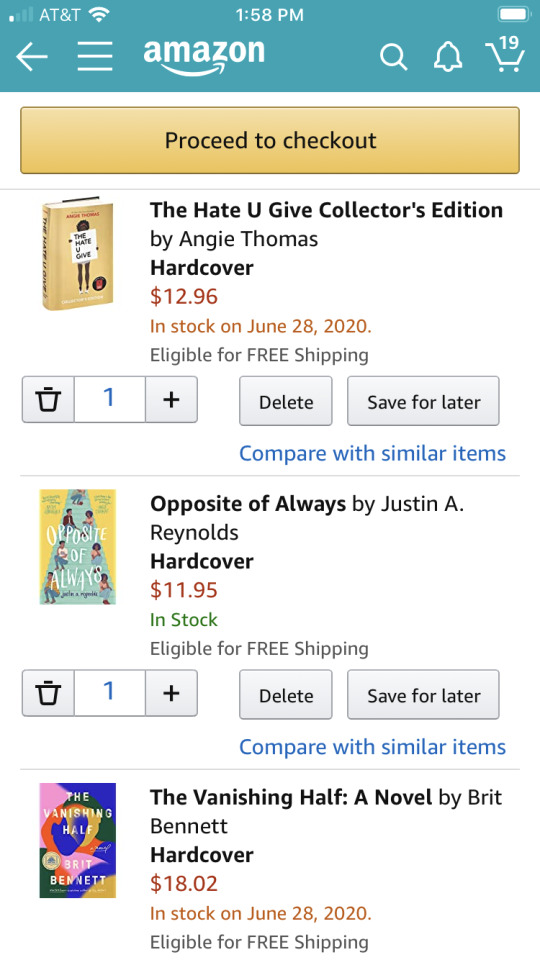
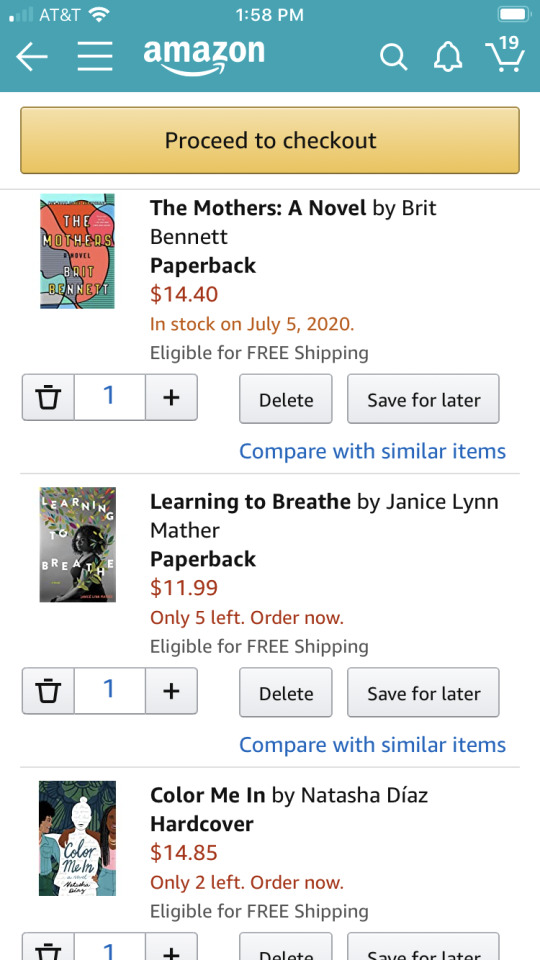
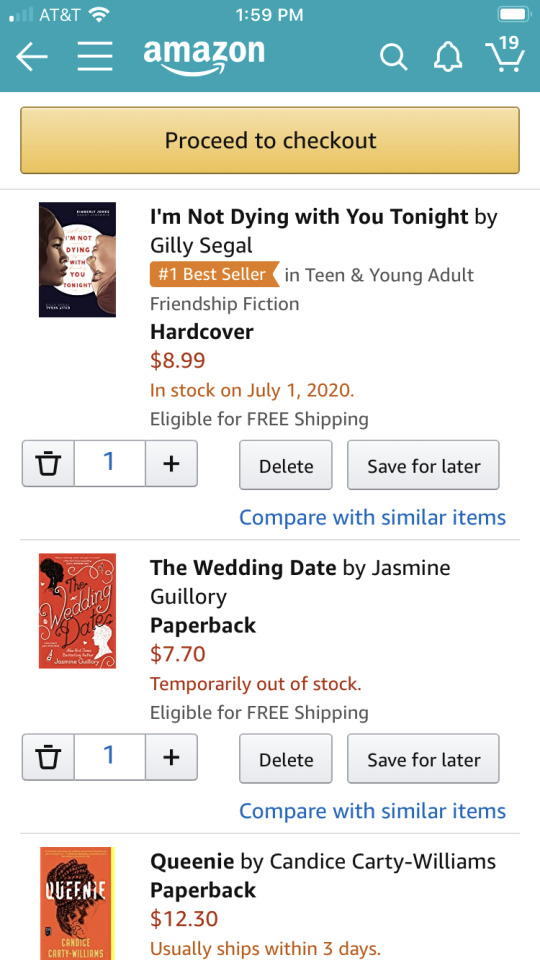
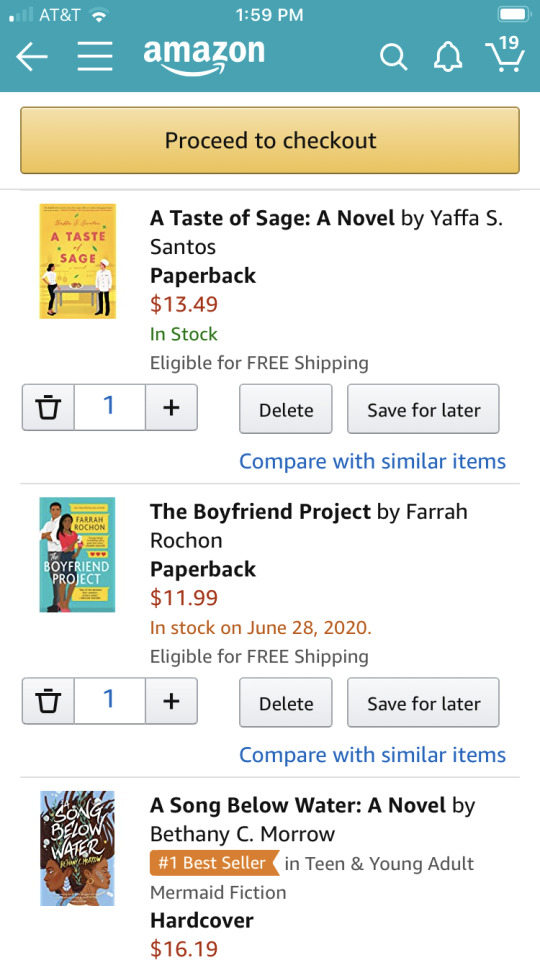
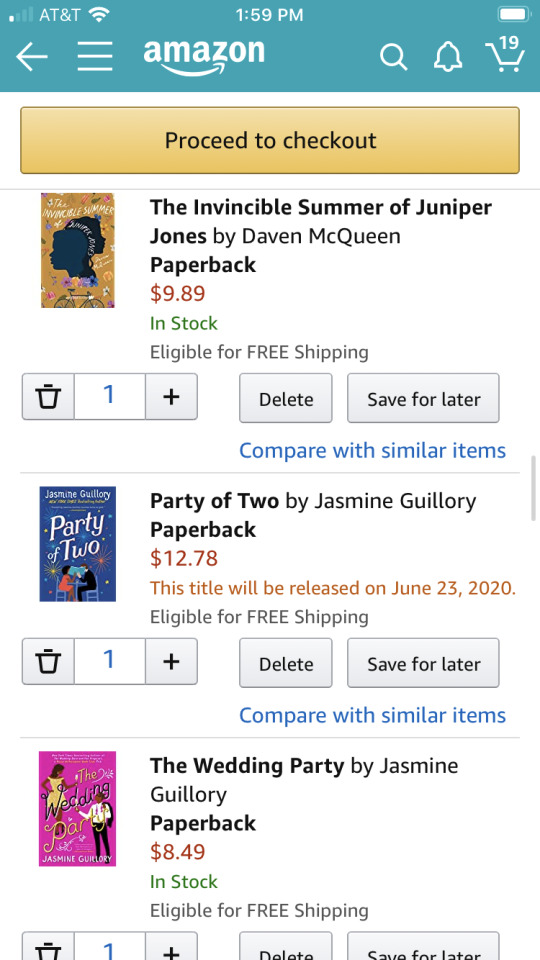

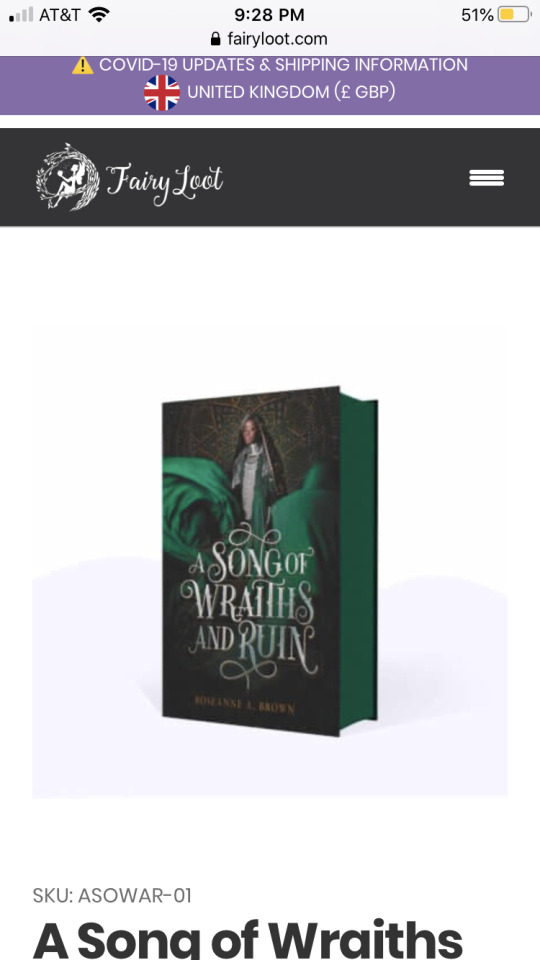
Other than The Moment of Truth—which is a romance book in a series I didn’t have yet—the rest of the book order I’m placing this week are all by black or POC authors.
The Poet X by Elizabeth Acevedo is about a teenage girl who discovers slam poetry and is told in verse. I own and read her other two books, I just haven’t read her debut novel yet.
On The Come Up and The Hate U Give by Angie Thomas are books I’ve read before, but I don’t own them. I really want to add them to my collection though because I enjoyed them so much. Especially THUG because it’s such a powerful book about police brutality and what the black community really goes through.
Opposite Of Always by Justin A. Reynolds is a romance/contemporary. I’m not exactly sure of the premise, but this guy meets the love of his life then loses her when she dies suddenly, but he keeps reliving the first time he meets her over and over again? Something on that order.
The Vanishing Half and The Mothers by Brit Bennett are two books that have caught my eye and sound really good. I’m not entirely sure of what they’re about other than it deals with typical stereotypes against black people and racisim and they sound like they’re going to be really powerful books.
Learning To Breathe by Janice Lynn Mather is a contemporary about a young, black teenaged girl with a strict aunt. She’s never done anything to disobey her aunt, but when she gets pregnant and finds herself homeless, she ends up at this yoga retreat, hoping to find a home there and she finds so much more, including friends, support and love all around.
Color Me In by Natasha Díaz is about a girl who goes to live with her mother in her childhood home after her parents divorce. Being a biracial child—her father white and Jewish and her mother black—she struggles with finding her identity, especially when cousins on her mother’s side of the family claim she has no idea what it’s like to experience their pain and problems because she’s too white.
I’m Not Dying With You Tonight by Gilly Segal is another book I’m not quite sure what it’s about other than I know it involves two strangers—one white and one black—that meet in the face of racial inequalities and a race riot that turns their town upside down. It sounds like a great book that has important messages and also even a possible friendship in it.
Queenie by Candice Carty-Williams is another book I’ve been wanting to read for a while. It’s about a Jamaican woman living in London learning how to find herself after a breakup with a long time white boyfriend (I think I remembered that correctly).
A Taste Of Sage by Yaffa S. Santos isn’t actually a black author, but she is a POC author and this adult romance sounded intriguing. What pulled me in was the fact the main woman character who can cook also has the talent to know what a person is feeling by tasting what they’ve cooked. I think that’s what it is? But it sounds intriguing either way.
The Boyfriend Project by Farrah Rochon is a romance/friendship strong contemporary. Three girls find out they’re dating the same man and decide to become friends instead of hating one another. For some self care, they agree for a year or so not to date at all and just focus on having fun with friends and each other, but apparently there’s a guy that comes along and threatens that no dating period for the main character. (This apparently is going to be a series, each book focusing on each of the three girls’ stories)
A Song Below Water by Bethany C. Morrow. Honestly all I know about this is that there are black mermaids and I was like SOLD!
The Invicible Summer of Juniper Jones by Daven McQueen is a book that—and bear with me with this explanation—is one of my friend’s friends’ girlfriend. My friend recommended this to me since I was looking to support some POC authors and this takes place in the mid 1950s I think, when the main male and biracial character is sent to Alabama to spend the summer with his aunt and uncle and for the first time seems to experience difficulty regarding his skin color. Juniper Jones who happens to be the town’s outcast and doesn’t like to follow the society’s rules forms a friendship with him and the two take on the summer together.
The Wedding Date, Party Of Two, The Wedding Party and The Proposal by Jasmine Guillory is a series of adult romance companion novels. I already bought the Christmas themed one for this holiday season and I wanted to purchase the entire series.
Lastly, A Song Of Wraiths and Ruins by Roseanne A. Brown is a fantasy based of African folklore. Two characters, a male and a female are set out to kill each other, but at the same time are falling in love with one another. This one has me SO excited.
Also I’m so sorry this is so long, I just wanted to share some great books and especially some written by POC authors. @spideyspencer @themetaphorgirl
#erin talks books#erin talks#personal#books#poc author#poc authors#bipoc authors#supporting poc authors#supporting bipoc authors#im so excited for these books
31 notes
·
View notes
Text
Episode 113 - Seeking Book Recommendations
This episode we’re Seeking Book Recommendations! We’ve each picked some topics and we’re going to perform Readers’ Advisory interviews to help figure out what titles to suggest to each other.
You can download the podcast directly, find it on Libsyn, or get it through Apple Podcasts, Stitcher, Google Podcasts, Spotify, or your favourite podcast delivery system.
In this episode
Anna Ferri | Meghan Whyte | Matthew Murray | RJ Edwards
Recommendations Wanted!
RJ
An indie tabletop game
Sci-fi/fantasy set in contemporary real world, but the sf/fan elements are NOT secret/hidden/underground
Fiction set at Christmastime/non-fiction about Christmas
Matthew
Slavic/Eastern European Folklore
Horror
Space Opera
Anna
Humanism in/of healthcare
Urban fantasy
Feminist Essay Collection
Meghan
Fiction (not a thriller) that surprises
Poetry
Russian language learning materials
Media We Mentioned
Shadowrun (Wikipedia)
Sleepaway
FATE
GURPS
God's Hotel: A Doctor, a Hospital, and a Pilgrimage to the Heart of Medicine by Victoria Sweet
The Soul of Care: The Moral Education of a Husband and a Doctor by Arthur Kleinman
Black Man in a White Coat: A Doctor's Reflections on Race and Medicine by Damon Tweedy
Drive Your Plow Over the Bones of the Dead by Olga Tokarczuk
Your Republic is Calling You by Kim Young-Ha
Meghan discusses this book in Episode 013 - Spies and Espionage
Tell the Machine Goodnight by Katie Williams
Curse Workers series by Holly Black
Uzumaki by Junji Ito
Solaris by Stanisław Lem
Solaris (1972 film) (Wikipedia)
The Stand by Stephen King
Hellboy, Vol. 1: Seed of Destruction by Mike Mignola, John Byrne
SCP
Document 050 - "The Great Researcher Prank War of '██"
SCP-087 - “an unlit platform staircase”
SCP-2521
We Need To Talk About Fifty-Five
Top Rated Pages
IRL by Tommy Pico
Fragile Things: Short Fictions and Wonders by Neil Gaiman
The Day the Saucers Came
Mass Effect (Wikipedia)
The Dispossessed by Ursula K. Le Guin
Ancillary Justice by Ann Leckie
The Long Way to a Small, Angry Planet by Becky Chambers
A Big Ship at the Edge of the Universe by Alex White
Links, Articles, and Things
Desert Bus for Hope
Gritty (mascot)
Hark! Podcast
Cyrillic script (Wikipedia)
20 Religious Non-Fiction Books by BIPOC (Black, Indigenous, & People of Colour) Authors
Every month Book Club for Masochists: A Readers’ Advisory Podcasts chooses a genre at random and we read and discuss books from that genre. We also put together book lists for each episode/genre that feature works by BIPOC (Black, Indigenous, & People of Colour) authors. All of the lists can be found here.
Decolonial Christianities: Latinx and Latin American Perspectives edited by Raimundo Barreto and Roberto Sirvent
God is Red: a Native View of Religion by Vine Deloria
Orishas, Goddesses, and Voodoo Queens: The Divine Feminine in the African Religious Traditions by Lilith Dorsey
Tears We Cannot Stop: A Sermon to White America by Michael Eric Dyson
That Can Be Arranged: A Muslim Love Story by Huda Fahmy
The Color of Love: A Story of a Mixed-Race Jewish Girl by Marra B Gad
We Have Always Been Here: A Queer Muslim Memoir by Samra Habib
Lovesong: Becoming a Jew by Julius Lester
Stalking God: My Unorthodox Search for Something to Believe In by Anjali Kumar
Her Name Is Kaur: Sikh American Women Write about Love, Courage, and Faith edited by Meeta Kaur
See No Stranger: A Memoir and Manifesto of Revolutionary Love by Valarie Kaur
In Love With the World: A Monk's Journey Through the Bardos of Living and Dying by Yongey Mingyur, with Helen Tworkov
The Heart of the Buddha's Teaching: Transforming Suffering into Peace, Joy, and Liberation by Thich Nhat Hanh
The Four Sacred Gifts: Indigenous Wisdom for Modern Times by Dr. Anita Sanchez
Why I am a Hindu by Shashi Tharoor
The Color of Compromise: The Truth About the American Church's Complicity in Racism by Jemar Tisby
Unashamed: Musings of a Fat, Black Muslim by Leah Vernon
Embers: One Ojibway's Meditations by Richard Wagamese
I Bring the Voices of My People: A Womanist Vision for Racial Reconciliation by Chanequa Walker-Barnes
New World A-coming: Black Religion and Racial Identity During the Great Migration by Judith Weisenfeld
Give us feedback!
Fill out the form to ask for a recommendation or suggest a genre or title!
Check out our Tumblr, follow us on Twitter or Instagram, join our Facebook Group, or send us an email!
Join us again next week, on Tuesday, November 24th as we give each other the Book Recommendations we asked for this week.
Then on Tuesday, December 1st we’ll be discussing the genre that you chose for us to read, New Weird Fiction!
Finally, on Tuesday, December 15th it’ll be our Best of 2020 episode!
4 notes
·
View notes
Photo
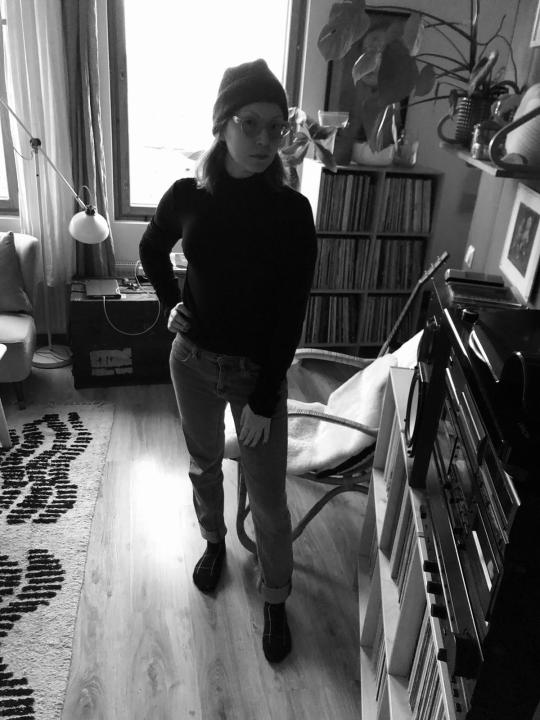
ASTRID SWAN
1. Taylor Swift: Folklore (2020, album) This year the so-called mainstream and the sidelines flow into each other. There are no borders between formula, selling, style and that is freeing for all who make art. Maybe in that sense a global pandemic is putting us on a more even creative keel. It’s providing time for all to actually make art rather than to focus on its marketing. Maybe. Taylor Swift’s first quarantine album became my favorite immediately. I have had it on probably every day for the past months. The marriage of Aaron Dessner’s delicate looping swirling riffs with Swift’s sugary pop vocal hooks and storytelling were just what I needed for inspiration and comfort while sitting at my desk, staring at the screen, writing and glimpsing the sky each day, through the seasons.
2. Beyoncé: The Lion King – The Gift (2020, visual album) The visual album directed by Bey herself is another border breaking effort, questioning the imagined fencing between super fame and unknown artists, elevating the African continents, black and brown humans and culture and healing with beauty. The music relates to the Lion King film that came out in 2019 and so does the film, but its free too, writing and rewriting additional meanings, imagining differently. It’s abundance, shared space, nature, form – an amazing fiction and a powerful narrative to black and brown children: you matter, you are beautiful. My 8-year-old LOVES every second of it. It is radical to be one of the most famous identifiable voices in pop and to share the vocal space and songwriting with all these other voices. It is radical to believe in your own power to do many things well, and then do it.
3. Fiona Apple: Fetch the Bolt Cutters (2020, album) What a year! It feels like I am 17 again with all these albums that become part of my musical interior. My new, yet familiar furniture to lean on. Apple’s album is an amalgamation of all her albums so far. It’s a language I speak. It’s like listening to my big sister. It makes me glad to be alive in 2020 to hear her be able to bottle the vulnerability and wit and shake shake shake…
4. Shawn Colvin: Diamond in the Rough (book, 2012) I read a lot this year, which is no news. I’m always reading. Still, this is a revelation: since 2018 I’ve been listening to Colvin’s album A Few Small Repairs from 1996 every week. Yes, every week at some point I have to listen to this. This relates to the fact that I’ve rediscovered a lot of my 90s favorites and realized that I still love them. So, finally I realized that she published a memoir in 2012. I loved reading this book because it hasn’t been so long that I can read books by women songwriters. There just haven’t been that many. And this one addressed song writing and the conditions of her becoming a musician very well. It also dealt with alcoholism, mental health struggles and weaved mothering, romantic love and parental love into the narrative. Again, reading this inspired me to do what I do. Her writing made me feel less lonely and inspired to play the guitar again.
5. Hari Kunzru: Into the Zone (podcast) Podcasts have become an almost too present noise in my mornings, my walks, my cooking, my escape from the family… in a small home with everyone home, you can make space by listening to your own boring talk shows so loud that it drowns out Neil Young and muddles YouTube kids and the endless video game or Lego reviews. So, I discovered Into the Zone. I love it passionately. It’s a literary writer’s and a researcher’s dream. Kunzru is able to tell narratives of far apart subjects and show how they relate and influence each other. He talks much about music, racism, ideas of genre, imagined futures… to be honest, I felt like writing a letter of thank you to him, that’s how much I loved this. I haven’t written the letter though, because I could not find his email address.
6. “How to Stop a Power Grab” by Andrew Marantz in The New Yorker. November 23rd, 2020. This great article looks into what we know about peaceful dissent, interviewing Erica Chenoweth who is an important voice for all kinds of civil organizing and dissent such as the Black Lives Matter -movement. Chenoweth has studied and found that peaceful dissent is more likely to lead to political change than violence. Her book with Maria Stephan Why Civil Resistance Works came out in 2013 and is considered a watershed book for civil organizing. Reading this article gave me hope; maybe instead of a major global disaster bigger than 2020, we are learning, we are on the brink of better times, of realizing that we all have to care for all and act upon the betterment of our conditions. That science is showing us that violence is a dead end. That things are changing. That from the perspective of centuries, our slow learning is accelerating.
7. I’ll Be Gone in the Dark (TV Series, HBO) Michelle McNamara’s book by the same name was a hit a little while ago and this year, the HBO documentary series brings the entangled narratives of McNamara, the horrific victim stories and the story of the EAR/Night Stalker together much like the book. The criminal titled EAR who violated the lives of so many and killed many from 1960s until recently in California, USA is kind of at the center of the story, but also, he is a side character to something more interesting. For me, the true crime aspect of this program was not as compelling as the story of McNamara’s discovery of writing, her ability to fuse detective skills and storytelling and her inability to address her personal struggles while doing it. It is a tragedy. I was struck by the documentary’s skill at talking also about mothering, a romantic relationship and childhood and to relate all this to the way this woman worked, developed her professional situation. And all this, while investigating murders and rapes that happened long ago and were never solved. Watching this made me a fangirl of McNamara and it made me want to become an amateur sleuth and also a filmmaker in my next life. Finally, during the year I fluctuated between wanting to watch old films, familiar series and yearning to be shook out of my usual corners. Being true crime this series was super scary for me – but it was more about telling stories really than about the crime, so I grit my teeth and closed the blinds and told myself I’m safe and I watched the series twice already. Guardian review of the show.
2 notes
·
View notes